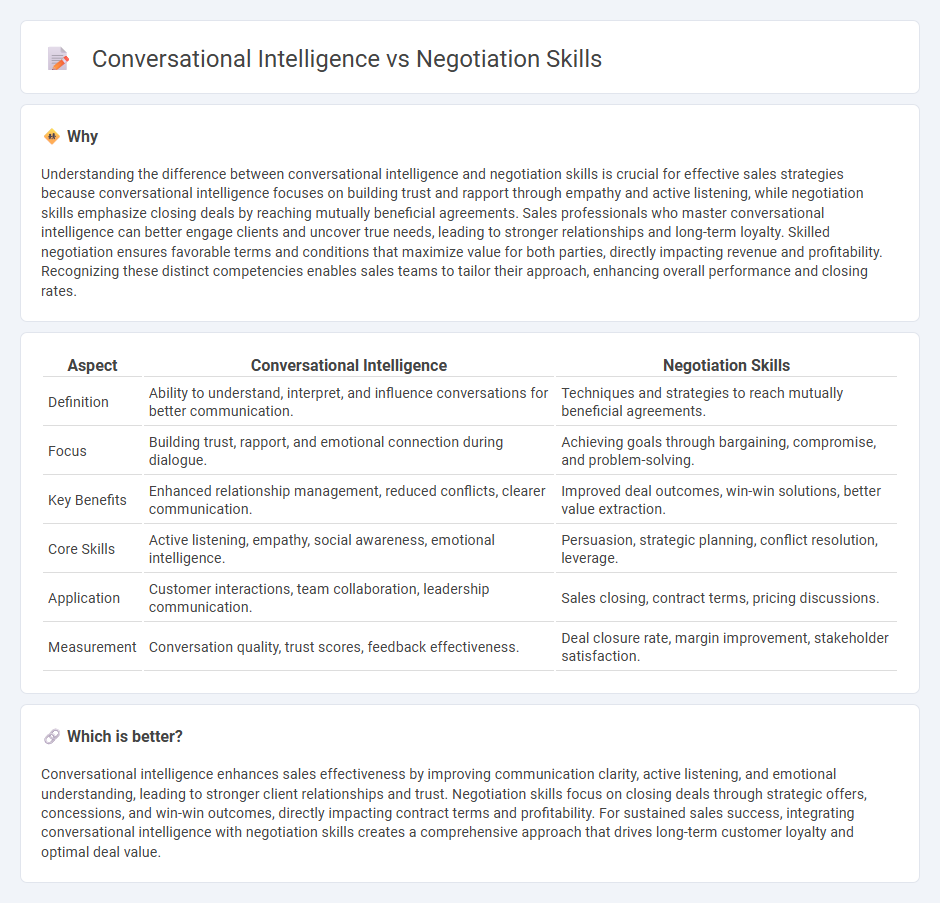
Conversational intelligence enhances sales performance by enabling deeper rapport and trust-building through effective communication techniques, while negotiation skills focus on securing favorable terms and closing deals efficiently. Integrating conversational intelligence with negotiation tactics increases the likelihood of mutually beneficial outcomes and long-term client relationships. Explore how mastering both can transform your sales strategy and boost results.
Why it is important
Understanding the difference between conversational intelligence and negotiation skills is crucial for effective sales strategies because conversational intelligence focuses on building trust and rapport through empathy and active listening, while negotiation skills emphasize closing deals by reaching mutually beneficial agreements. Sales professionals who master conversational intelligence can better engage clients and uncover true needs, leading to stronger relationships and long-term loyalty. Skilled negotiation ensures favorable terms and conditions that maximize value for both parties, directly impacting revenue and profitability. Recognizing these distinct competencies enables sales teams to tailor their approach, enhancing overall performance and closing rates.
Comparison Table
| Aspect | Conversational Intelligence | Negotiation Skills |
|---|---|---|
| Definition | Ability to understand, interpret, and influence conversations for better communication. | Techniques and strategies to reach mutually beneficial agreements. |
| Focus | Building trust, rapport, and emotional connection during dialogue. | Achieving goals through bargaining, compromise, and problem-solving. |
| Key Benefits | Enhanced relationship management, reduced conflicts, clearer communication. | Improved deal outcomes, win-win solutions, better value extraction. |
| Core Skills | Active listening, empathy, social awareness, emotional intelligence. | Persuasion, strategic planning, conflict resolution, leverage. |
| Application | Customer interactions, team collaboration, leadership communication. | Sales closing, contract terms, pricing discussions. |
| Measurement | Conversation quality, trust scores, feedback effectiveness. | Deal closure rate, margin improvement, stakeholder satisfaction. |
Which is better?
Conversational intelligence enhances sales effectiveness by improving communication clarity, active listening, and emotional understanding, leading to stronger client relationships and trust. Negotiation skills focus on closing deals through strategic offers, concessions, and win-win outcomes, directly impacting contract terms and profitability. For sustained sales success, integrating conversational intelligence with negotiation skills creates a comprehensive approach that drives long-term customer loyalty and optimal deal value.
Connection
Conversational intelligence enhances negotiation skills by enabling deeper understanding of counterpart motives, fostering trust, and effectively managing dialogue flow. Mastery in conversational intelligence allows sales professionals to detect underlying needs and emotions, which guides strategic concessions and persuasive communication. This synergy improves deal outcomes by aligning interests and building stronger client relationships.
Key Terms
**Negotiation Skills:**
Negotiation skills encompass techniques for effective communication, conflict resolution, and value creation in business or personal interactions. Mastering negotiation involves strategic planning, emotional intelligence, and the ability to influence outcomes favorably while maintaining positive relationships. Explore how enhancing these skills can transform your professional and personal engagements.
BATNA (Best Alternative to a Negotiated Agreement)
Negotiation skills emphasize identifying and strengthening your BATNA to ensure leverage and preparedness during discussions, allowing you to make informed decisions when alternatives are available. Conversational intelligence, by contrast, focuses on building trust and rapport to facilitate open dialogue, but may not directly address BATNA analysis. Explore how mastering both approaches can enhance your strategic negotiation outcomes and relational dynamics.
Win-Win Outcome
Negotiation skills emphasize structured techniques to achieve a win-win outcome by balancing interests and fostering mutual agreements. Conversational intelligence enhances this process by building trust, understanding underlying emotions, and promoting open dialogue for deeper collaboration. Explore how integrating both approaches can elevate your ability to create lasting, equitable solutions.
Source and External Links
6 Negotiation Skills All Professionals Can Benefit From - Key negotiation skills include communication, emotional intelligence, planning with knowledge of BATNA and ZOPA, value creation, strategy, and reflection to achieve favorable outcomes.
12 Important Negotiation Skills (With Definition and Tips) | Indeed.com - Essential negotiation skills feature communication, active listening, emotional intelligence, expectation management, and patience to foster understanding and reach compromises.
Top 10 Negotiation Skills You Must Learn to Succeed - Top negotiation skills to master include analyzing and improving your BATNA, negotiating the process itself, building rapport, active listening, and asking insightful questions to balance collaboration and competition.
 dowidth.com
dowidth.com